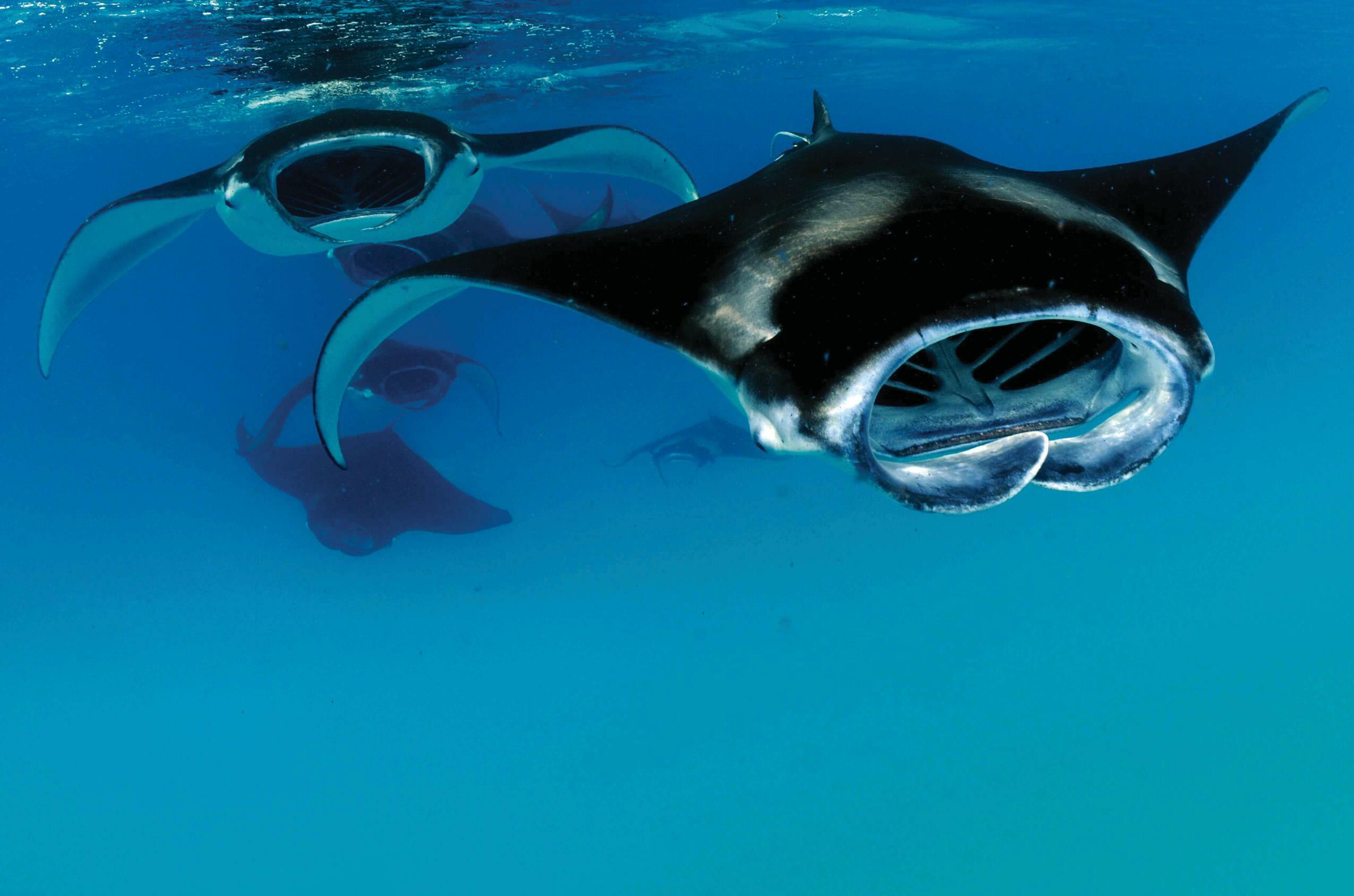
IN THE GLASS-CLEAR WATERS OFF THE MALDIVES' Raa Atoll, something akin to an underwater circus is taking place. The manta rays that have gathered near our boat streak through the water, unfurling their wings as they perform barrel rolls, somersaults and sudden dives. They disappear into the depths before magically reappearing, mouths agape and cephalic fins (horn-like structures used for feeding) curled as they gulp down tiny plankton invisible to the naked eye.
Watching marine biologist Jess Haines in action is no less impressive - even more so given she hasn't been blessed with the ability to breathe underwater. Jess trails the manta rays as they perform their acrobatics, snapping pictures of their undersides.
Manta ray bellies, known as 'ventral surfaces', each bear a unique pattern of spots that act much like a human fingerprint. In the absence of tags, which are banned in the Maldives, photos enable scientists to identify every individual and thus monitor movements, population dynamics and feeding and breeding hotspots. Given that manta rays are now listed as Threatened by the IUCN, with populations increasingly affected by over fishing and by catch, this is vital research.
Jess's love affair with mantas began after she completed her zoology degree. Arriving in the Maldives in 2017 to work as a marine biologist and dive instructor on Dhaalu Atoll, she saw - and fell in love with - reef manta rays, the smaller of the two manta species. She started sending photos of individuals she encountered to the Manta Trust, a conservation organisation founded in 2011, helping to build a database in an area where it had no staff. In 2019, she joined the team as manager of the Maldivian Manta Ray Project. Protecting these spectacular marine creatures was now her day job.
This story is from the July 2023 edition of BBC Wildlife.
Start your 7-day Magzter GOLD free trial to access thousands of curated premium stories, and 8,500+ magazines and newspapers.
Already a subscriber ? Sign In
This story is from the July 2023 edition of BBC Wildlife.
Start your 7-day Magzter GOLD free trial to access thousands of curated premium stories, and 8,500+ magazines and newspapers.
Already a subscriber? Sign In

Flightless birds
Our pick of 10 curious birds that have lost the ability to fly

ALL YOU EVER NEEDED TO KNOW ABOUT THE Shoebill
THIS PREHISTORIC-LOOKING BIRD IS affectionately known by some as 'king of the marshes' as it is huge (up to 1.5m tall with a 2.4m wingspan) and resides in the freshwater marshes and swamps of East Africa.

Slime: protector, lubricant and glue
GOO, GUNGE, GUNK... WHILE THERE are many names for the stuff that makes things slippery or sticky, slime isn't a single material but a label for a variety of substances with similar physical properties. Those qualities are desirable to many living things, which is why slime is made by such a wide range of organisms.

How do parrots learn to swear?
THERE ARE FEW THINGS AS GLORIOUSLY entertaining as the effing and blinding of a potty-mouthed parrot.

Why are walruses so chubby?
AS A GENERAL RULE, TERRESTRIAL mammals are furry, while aquatic ones are fat. It doesn't work across the board: sea otters rarely leave the water but have the densest fur of any mammal.

What is the lotus effect?
WHEN YOU FIND YOURSELF WATCHING the clock on the wall of a dentist's waiting room, you can always pass a bit of time with a rummage through the bowl of fragrant botanical wonders next to the leaflets about expensive cosmetic work.

Are there any plants in Antarctica?
CONTINENTS DON'T COME ANY MORE inhospitable than Antarctica, where life must contend with the longest, darkest, coldest winters and a year-round blanket of snow and ice.

LANDLORD OF THE WILD
The humble aardvark is seldom praised for its work digging out homes for other animals

CRACK DOWN
As the new Amazon drama Poacher hits our screens, we take a look at the fight to end ivory poaching in India

Wild words
Spending time observing and writing about the natural world can be transformational